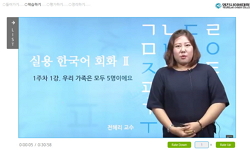Park Sun described the devastated royal court, fierce party strife, terrible disasters faced by talents, and hardship of the people via figurative satires to reveal his consciousness of distress and expressed his desire for the appointment of talents ...
http://chineseinput.net/에서 pinyin(병음)방식으로 중국어를 변환할 수 있습니다.
변환된 중국어를 복사하여 사용하시면 됩니다.
- 中文 을 입력하시려면 zhongwen을 입력하시고 space를누르시면됩니다.
- 北京 을 입력하시려면 beijing을 입력하시고 space를 누르시면 됩니다.

朴淳 詩의 道學的 側面에 대하여 ― 花潭學派의 특성과 관련하여 ― = A Study on Neo-confucianism Aspects of Park Sun's Poems - Connections to the Characteristics of the Hwadam School
한글로보기https://www.riss.kr/link?id=A108183492
-
저자
유호진 (고려대학교)
- 발행기관
- 학술지명
- 권호사항
-
발행연도
2022
-
작성언어
Korean
-
주제어
經世意識 ; 순결한 마음 ; 堅貞한 태도 ; 노동하는 생활 ; 事功 ; 實用 ; 花潭學派. ; philosophy of governance ; pure mind ; firm and upright attitude ; life of labor ; Sagong(事功) ; practical ; Hwadam(花潭) School.
-
등재정보
KCI등재
-
자료형태
학술저널
- 발행기관 URL
-
수록면
37-63(27쪽)
-
KCI 피인용횟수
0
- 제공처
-
0
상세조회 -
0
다운로드
부가정보
다국어 초록 (Multilingual Abstract)
In Park's poems, clear and solid things make often appearances. Such clear things as the moon, water, and the crane, he expressed his direction towards a pure mind by purifying his desire. By depicting solid things such as cliffs and rocks along with clear ones, he implied that one could keep his or her pure mind with a firm and upright attitude to life. In addition, he pursued a poor but honest life and advocated labor. His poems depicting a life of labor are especially noteworthy as they show his practical mindset. His practical attitude stemmed from his viewpoint of valuing self-complacency in learning.
Presenting his yearning for ideal governance, emphasis on the body and mind training, and desire for a unique ideal in life, his poems fully display his aspects as a moralist. In particular, his tendency toward Sagong(事功) demonstrated in his pursuit of ideal governance and his practical attitude in his ideal in life reflect the unique aspects of the Hwadam(花潭) School hard to find in the Toigye School and the Nammyeong School.
Park Sun described the devastated royal court, fierce party strife, terrible disasters faced by talents, and hardship of the people via figurative satires to reveal his consciousness of distress and expressed his desire for the appointment of talents and the rule by a wise king to display his philosophy of governance. His consciousness was different from the direction that Toigye(退溪) and Nammyeong(南冥) were oriented to in their attempts at the gradual changes of the world in their retirement in that he constantly confronted the confusing reality of politics and tried to realize his political ideal in reality.
In Park's poems, clear and solid things make often appearances. Such clear things as the moon, water, and the crane, he expressed his direction towards a pure mind by purifying his desire. By depicting solid things such as cliffs and rocks along with clear ones, he implied that one could keep his or her pure mind with a firm and upright attitude to life. In addition, he pursued a poor but honest life and advocated labor. His poems depicting a life of labor are especially noteworthy as they show his practical mindset. His practical attitude stemmed from his viewpoint of valuing self-complacency in learning.
Presenting his yearning for ideal governance, emphasis on the body and mind training, and desire for a unique ideal in life, his poems fully display his aspects as a moralist. In particular, his tendency toward Sagong(事功) demonstrated in his pursuit of ideal governance and his practical attitude in his ideal in life reflect the unique aspects of the Hwadam(花潭) School hard to find in the Toigye School and the Nammyeong School.
동일학술지(권/호) 다른 논문
-
- 동양고전학회
- 안이슬
- 2022
- KCI등재
-
- 동양고전학회
- 우명길
- 2022
- KCI등재
-
- 동양고전학회
- 정기선
- 2022
- KCI등재
-
芝嶺錄 소재 「今俗行用歌曲」「長歌」「別曲」의 특성 재론
- 동양고전학회
- 권순회
- 2022
- KCI등재
분석정보
인용정보 인용지수 설명보기
학술지 이력
| 연월일 | 이력구분 | 이력상세 | 등재구분 |
|---|---|---|---|
| 2027 | 평가예정 | 재인증평가 신청대상 (재인증) | |
| 2021-01-01 | 평가 | 등재학술지 유지 (재인증) |  |
| 2018-01-01 | 평가 | 등재학술지 유지 (등재유지) |  |
| 2015-01-01 | 평가 | 등재학술지 유지 (등재유지) |  |
| 2011-01-01 | 평가 | 등재학술지 유지 (등재유지) |  |
| 2008-01-01 | 평가 | 등재학술지 선정 (등재후보2차) |  |
| 2007-01-01 | 평가 | 등재후보 1차 PASS (등재후보1차) |  |
| 2005-01-01 | 평가 | 등재후보학술지 선정 (신규평가) |  |
학술지 인용정보
| 기준연도 | WOS-KCI 통합IF(2년) | KCIF(2년) | KCIF(3년) |
|---|---|---|---|
| 2016 | 0.48 | 0.48 | 0.44 |
| KCIF(4년) | KCIF(5년) | 중심성지수(3년) | 즉시성지수 |
| 0.44 | 0.42 | 1.058 | 0.15 |




 KCI
KCI eArticle
eArticle




